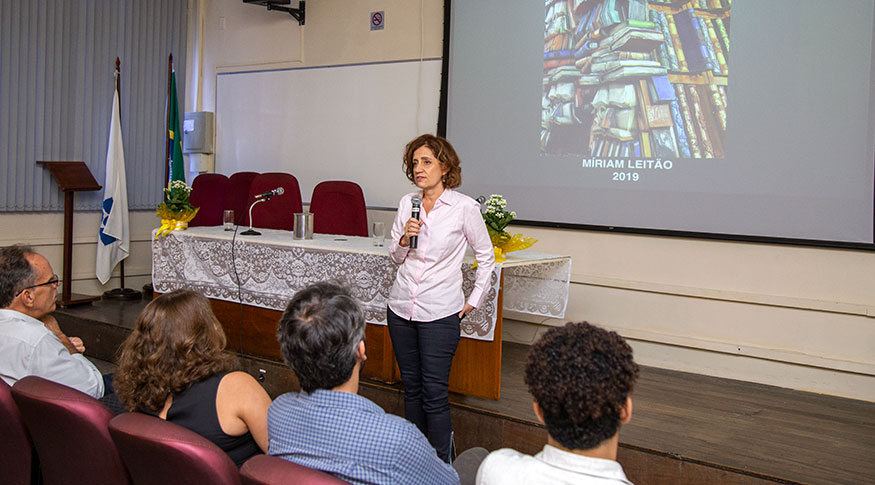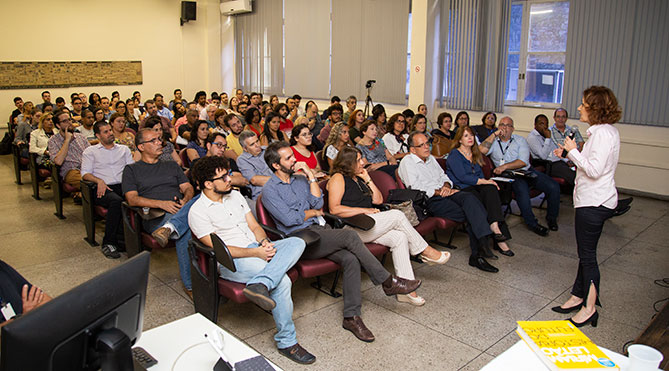ENCE
Miriam Leitão reflects upon the country's future at inaugural class in School of Statistics
March 12, 2019 02h30 PM | Last Updated: March 15, 2019 04h50 PM

Journalist Miriam Leitão gave a lecture, yesterday (11), at the inaugural class of the Doctoral and Master's Program of Population, Territory and Public Statistics, at the National School of Statistical Sciences (Ence), in Rio de Janeiro, with the presence of IBGE directors, professors and students.
In the lecture History of the Future – Thoughts on permanence, the journalist presented the results of almost three years of interviews, trips and data analyses which originated a book and a series of TV shows . The presenter claimed that the country has a great potential to face the challenges posed by the future thanks to its biodiversity.
Miriam Leitão advised, at the inaugural class, that the future will be relentless with the unprepared countries because of the fast technological changes, the reduction of employment and population aging. “What the country has been doing for the past few years is to wait for the future, but, first and foremost, it should understand the present and plan the future. If Brazil makes intelligent choices, it will adapt well to the future", she said.
One of the greatest advantages of the country in a changing atmosphere is its natural riches. In order to produce the show, Miriam Leitão visited five Brazilian biomes, together with experts on each region and, in the Amazon, she realized that one of the most important future demands is water resources; an there is plenty of it in Brazil.
The journalist also traveled to the Cerrado, which is known as the Brazilian "water tank", where several rivers are born. Visiting the project SOS Atlantic Forest, in São Paulo, the presenter showed that, besides conserving nature, it is necessary to replant. In the Pampa biome, she emphasized the enormous diversity and in the Caatinga, the "stubbornness" of species in an arid climate.
The journalist got familiar with initiatives to produce wind energy in Rio Grande do Norte and photovoltaic (solar) energy in Paraná, which can reduce the impacts of electric energy production on the environment, since they are clean sources. Regarding education, Miriam visited schools that are examples of excellence and that, according to her, need to be replicated in the country.
In the series History of the Future, the presenter used several economic and social data from the IBGE. "When I write a news article, if I do not have IBGE data, I go on a blind flying as I am unable to inform people, to do my job. And journalists like me are just one category of users; there are several others across the country. There is no research that can be done, ideas that can be reasonable sustained without the numbers. And the greatest producer of quality statistics in Brazil is the IBGE, "said the journalist.

According to Ence's director, Maysa Sacramento, the inaugural class is a tradition at all levels and is very important because it attempts to bring students comprehensive views linked to the school's research trends in statistics. Cesar Marques da Silva, the coordinator of the postgraduate program, emphasized: "The goal in bringing Miriam Leitão is to show students that what we do here reverberates out there; that is why it is important to integrate Ence with the IBGE and with society as a whole".
About the jornalist
Miriam Leitão is a journalist and Brazilian television presenter. Currently, she presents GloboNews Miriam Leitão and makes comments on Bom Dia Brasil (Good Morning, Brazil) and on the Panorama Economico (Economic Overview) column of O Globo. She was awarded the Jabuti Prize for Non-Fiction in 2012, with the book Brazilian Saga: the Long Struggle of a People for its Currency'. She has already gotten journalism awards for Tolerance, Economic Journalism, granted by the Brazilian Association of Economists, and the Prêmio Esso (Esso Awards) for Scientific, Technological or Environmental Information.




















